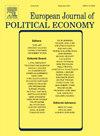领导人和制度是经济增长的共同决定因素
IF 2.4
3区 经济学
Q2 ECONOMICS
引用次数: 0
摘要
在本文中,我认为国家领导人和机构共同决定了跨国收入差异。我记录了两个新的跨国风格化事实:(1)民主国家的国家领导人比非民主国家的领导人有更多的任职前工作经验,这是衡量领导人能力的一种新方法;(2)工作经验更多样化的领导人在民主国家有更好的经济表现,在非民主国家有更高的政权稳定性。我通过几种工具变量方法建立了稳健性,基于接近选举的回归不连续设计,以及(准)随机领导过渡。我建立了一个包含政治选择和制度变迁的内生增长模型来合理化这些事实。基于该模型的定量练习表明,政治选择渠道和领导人角色的差异可以解释民主国家和非民主国家之间持续存在的收入差距。本文章由计算机程序翻译,如有差异,请以英文原文为准。
Leaders and institutions as joint determinants of economic growth
In this paper, I argue that national leaders and institutions jointly determine cross-country income differences. I document two novel cross-country stylized facts: (1) national leaders in democracies have more pre-tenure work experience, a novel measure of leaders’ capabilities, than those in non-democracies, and (2) leaders with more diverse work experience lead to better economic performance in democracies and to higher regime stability in non-democracies. I establish robustness by several instrumental variable approaches, a regression discontinuity design based on close elections, and (quasi-)random leadership transitions. I build an endogenous growth model with political selection and institutional transitions to rationalize these facts. Quantitative exercises based on this model suggest that the differences in the channel of political selection and in the role of leaders can explain the persistent income gap between democracies and non-democracies.
求助全文
通过发布文献求助,成功后即可免费获取论文全文。
去求助
来源期刊

European Journal of Political Economy
Multiple-
CiteScore
3.40
自引率
10.00%
发文量
106
期刊介绍:
The aim of the European Journal of Political Economy is to disseminate original theoretical and empirical research on economic phenomena within a scope that encompasses collective decision making, political behavior, and the role of institutions. Contributions are invited from the international community of researchers. Manuscripts must be published in English. Starting 2008, the European Journal of Political Economy is indexed in the Social Sciences Citation Index published by Thomson Scientific (formerly ISI).
 求助内容:
求助内容: 应助结果提醒方式:
应助结果提醒方式:


